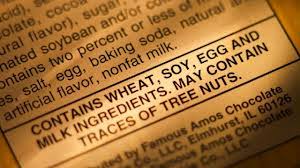
There is the obvious cost of collecting up distributed product and fixing or disposing of it, but also the cost of the extra verification, audit and testing requirements MPI will place on you as a result. Not to mention the potential bad publicity for your business.
The good news is that the vast majority of recalls published every year by MPI are the result of easily fixable mistakes. Below are our top 4 ways to avoid a product recall in your business.
1. Labelling:
The single biggest cause of product recalls in New Zealand is incorrect information on food labels. Particularly allergen warnings.
The simple rule of thumb on all food product packaging is, if it has any of the allergens listed below in it it needs to specifically state so. Even if it is obvious. Even if it is listed in the ingredients. Even if it is in the name of the product. Even peanut butter must warn that peanuts are present. The 8 allergens that MUST include their own separate warning are:
- Milk
- Egg
- Peanuts
- Tree nuts
- Soy
- Wheat
- Fish
- Shellfish
Keep an ongoing record of all of your products and the allergens they contain. This can act as a reference point for staff but is also something your verifier will want to review when they visit. If you don’t already have this in place click on the image below (or here) to download our Allergens Register to use.
2. Managing allergens onsite:
We have seen a number of products being recalled because the management of allergens while making products was not up to scratch. What I mean by that is, if there is ANY chance of an allergen being present, even in tiny amounts, there must be a warning on the packaging.
The easiest way to manage this is process, make, package and store products containing an allergen;
- Separately from everything else
- Using separate equipment and utensils.

- Environmental Hygiene
- Shelf-Life Testing of any new products.
- Ongoing product testing.
Your required testing procedures should be outlined in your Food Control Plan.
4. Stay Ahead, Stay Informed:
Sometimes a recall is unavoidable, particularly if it is an ingredient you use in your products that is being recalled by its manufacturer. What makes the biggest difference to how much this impacts on your business is TIME. The quicker you know about a suppliers recalled product, the quicker you can react and minimise the cost to you and your business.
Keep up to date on any supplier recalls by signing up to MPI notifications. Click below to complete registration.
If there is anything you would like to discuss about growing your business, or if you are looking to start a new business please feel free to contact me directly at anna@foodcontrolplans.co.nz or click below to book a quick chat with me either by phone or via zoom.






.svg)



